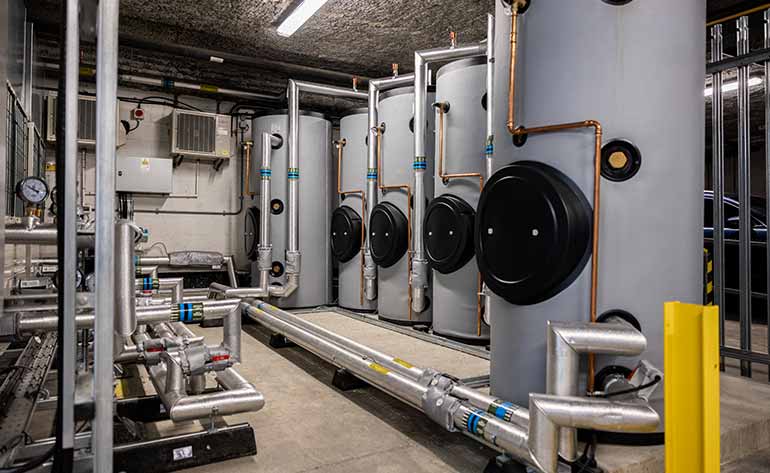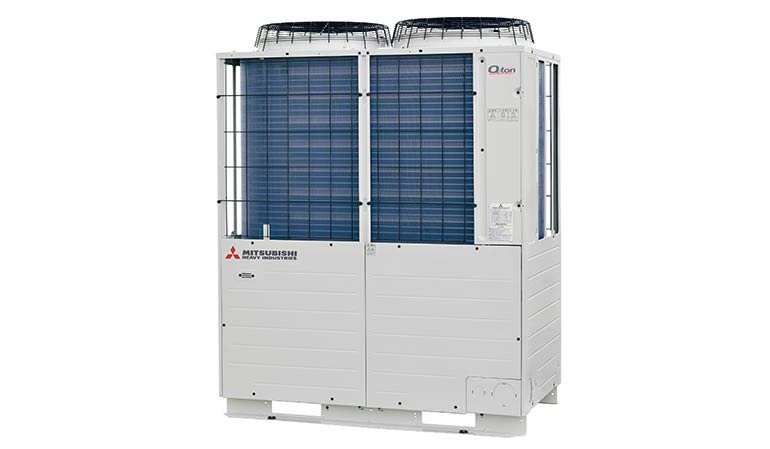No reservations with CO2 heat pumps
3rd March 2022
UK: Three Mitsubishi Heavy Industries Q-ton heat pumps are supplying the hot water requirements at a top contemporary London hotel.
The Citadines Holborn-Covent Garden London originally had gas-fired boilers, which provided potable hot water to the apart’hotel’s 192 apartments and communal breakfast area. Citadines required a replacement that could provide water at high temperatures, whilst ensuring minimal environmental impact.
The project at Citadines Holborn-Covent Garden, part of The Ascott Ltd portfolio – CapitaLand’s wholly owned lodging business unit – is part of CapitaLand’s 2030 sustainability plan. As part of the plan, a phased installation will also see the Q-ton system deployed at four other Citadines sites across the capital, in Islington, Barbican, South Kensington and Trafalgar Square.
“This a significant investment and action towards meeting both the UK government and CapitaLand’s 2030 sustainability master plan target of a 78% reduction in carbon emissions by 2035, for the UK Government, and 2030 for CapitaLand,” said Ryan Jules, regional maintenance manager at The Ascott Ltd UK, who hired KiPO Consultancy to assist with the key sustainability carbon reduction project.

The Q-ton uses CO2 to produce hot water ranging from 60˚C-90˚C, holding efficiencies when operating right up to 70˚C, which is required by the hotel to combat legionella.
“Whilst the Q-ton solution was marginally more expensive on capital costs than the traditional gas-fired alternative, the client was willing to make this extra investment, demonstrating their commitment to sustainability,” said Martin Craxton of consulting engineers KiPO.
“Central London’s atmosphere is now rid of the hotel’s 600 kW of gas-burning emissions. Q-ton holds its capacity down to -7˚C ambient and still provides full operation at -25˚C,” he added.
Unlike water heaters using gas or oil, renewable heating systems are not usually designed for instant hot water. Instead, KiPO designed the system using energy accumulation to meet the apart’hotel’s usage profile and peak load. The heat pump generates the energy, and a thermal store holds the hot water until it is used.
Principal contractor Nationwide Air Conditioning also installed six 1000-litre storage vessels at ground level while the original gas-fired water heaters at the roof level were still in use.
The transition to the new system was said to have taken just a few hours towards the end of the project, ensuring minimum disruption to the property.
Nationwide Air Conditioning was supported throughout the installation by the MHI specifications team. This included online design, training, system design schematics, a pre-commissioning site visit and assistance with final commissioning.
“On commissioning it was evident that the Q-ton equipment was more than capable of producing hot water at 70˚C, and the 6000 litres of storage ensured that the system could cope with periods of peak hot water demand,” said Nationwide Air Conditioning project manager Daniel Valente.
The building is also equipped with a Q-ton remote monitoring system, a tool that monitors Q-ton’s operation, provides the team with a quarterly report comparing energy usage and efficiencies against gas and electric equivalents and self-analyses to highlight any potential operation or maintenance requirements.







